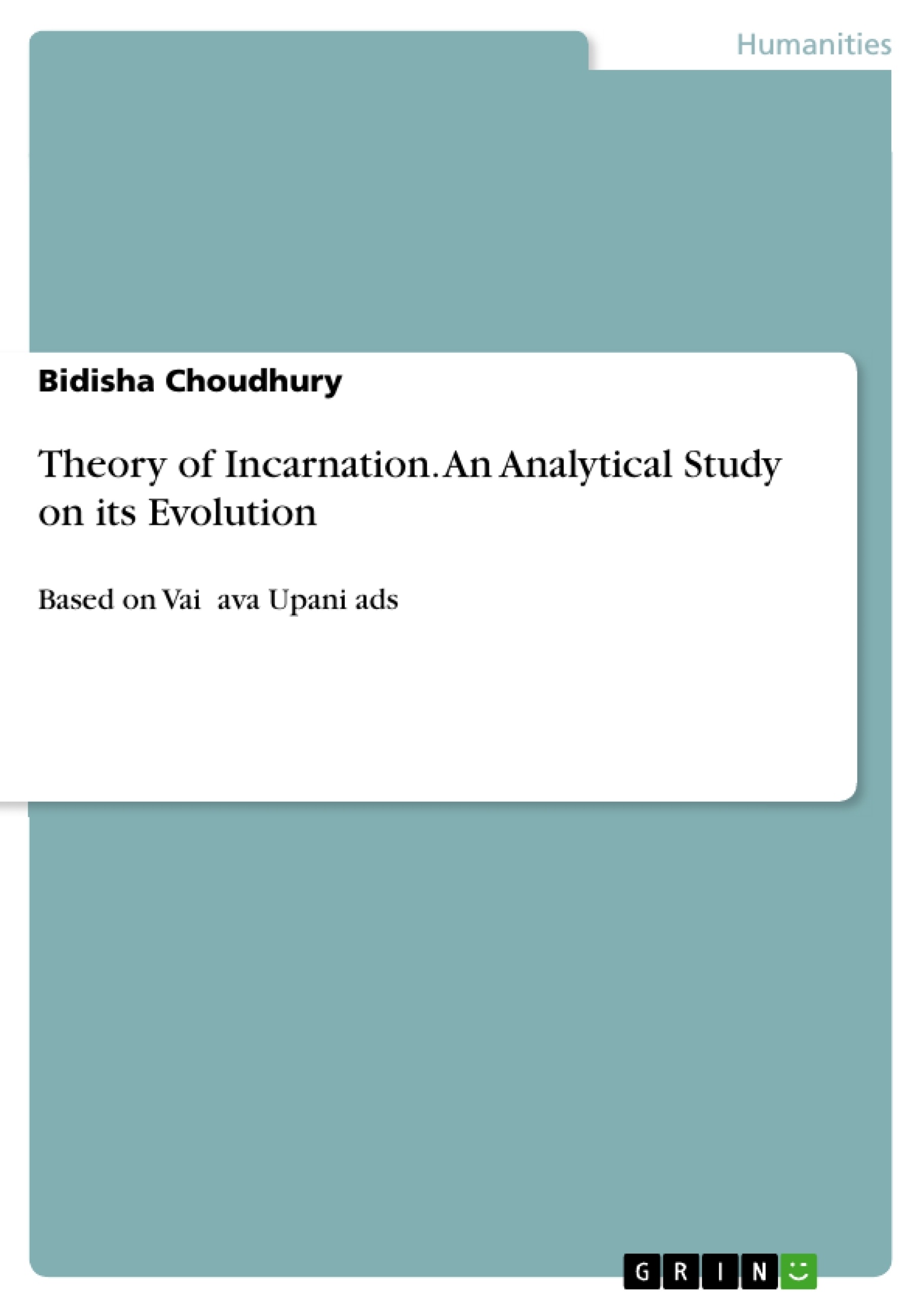The present work entitled ‘Theory of Incarnation: An Analytical Study on its Evolution (Based on Vaiṣṇava Upaniṣads)’ deals with the history and philosophy that comes in the path of evolution of incarnation. Its limitation is in the Vaiṣṇava theology. Thus, the principal aim of this work is to present an exhaustive as well as analytical approach of some faiths in idolatrous, those were inherited from earliest available materials to the time of Jayadeva, who is deemed to be the pioneer of the Vaiṣṇavism of the present day.
This work is a humble offering from me to the eminent scholars who want to explore the Vaiṣṇavism and philosophy and also for those who have vast knowledge and want to put forward some critical ideas along with analysis of socio-philosophical structure of Vaiṣṇavism with special reference on incarnation. The readers like them have been encouraged me to enter into this ocean of knowledge with small boat.
Upaniṣads are universally acknowledged as the main source of Indian theist philosophy. The latter Upaniṣads which are not commented on by Śaṃkaracārya, always claim equal attention in the matter of philosophical and socio- religious study, though they are known as minor Upaniṣads. The purpose of the present volume is to furnish an account of the deities known to India as the incarnated forms of Viṣṇu. This book caters vast hope as most of the things are explained in simple way and takes a character as simple as possible to make it understanding and interesting to the general reader as well as the scholars and interested people of Indology, History, Philosophy, Religion and obviously Sanskrit.
It is true that, scholars of wide reputation studied Vaiṣṇavism in a great way, yet the subject Vaiṣṇava Upniṣads, however can be treated in various other perspective also. It is so because a different trend can be traced in the mediaeval period that gave birth to a new tradition in the Upaniṣadic literature. Along with the pure Vedāntic Upniṣads a vast area of the later Upaniṣadic literature explores the yogic practice, life of Sanyāsins and sectarian practice. According to the Western Scholars of Indology like A.S. Geden, James Hastings etc., these Upaniṣads expound with more or less loyalty of the doctrines from the point of the popular religions, exalting Viṣṇu, or Śiva or endeavoring promotion of discipline and teaching yoga or other limited aims. From this perspective, these Upaniṣads can be classified into seven groups.
Inhaltsverzeichnis (Table of Contents)
- Preface
- Chapter 1: History and Philosophy of Incarnation
- Chapter 2: Upaniṣads and the Evolution of Incarnation
- Chapter 3: Vaiṣṇava Upaniṣads: A Classification
- Chapter 4: The Vaiṣṇava Tradition: A Shift in Focus
- Chapter 5: The Philosophical Basis of Vaiṣṇavism
- Chapter 6: The Role of the Upaniṣads in Vaiṣṇavism
- Chapter 7: Ātmabodha Upaniṣad and the Worship of Nārāyaṇa
Zielsetzung und Themenschwerpunkte (Objectives and Key Themes)
This work aims to present a comprehensive analysis of the evolution of the theory of incarnation within the context of Vaiṣṇava theology. It explores the historical and philosophical underpinnings of this concept, focusing on the role of the Vaiṣṇava Upanisads in shaping and articulating this belief system.
- The historical development of the concept of incarnation in Vaiṣṇava theology
- The role of the Vaiṣṇava Upaniṣads in shaping this concept
- The philosophical basis of Vaiṣṇavism and its relationship to Vedānta and Sāṇkhya
- The shift from Vedic rituals to idol worship in the Vaiṣṇava tradition
- The significance of the Upaniṣads in understanding the broader context of Vaiṣṇava philosophy and practice
Zusammenfassung der Kapitel (Chapter Summaries)
- Chapter 1: History and Philosophy of Incarnation: This chapter explores the historical and philosophical context surrounding the evolution of the concept of incarnation, setting the stage for the subsequent discussion of Vaiṣṇava theology.
- Chapter 2: Upaniṣads and the Evolution of Incarnation: This chapter examines the role of the Upaniṣads in shaping and articulating the concept of incarnation, highlighting the significance of these texts within the broader context of Indian religious and philosophical thought.
- Chapter 3: Vaiṣṇava Upaniṣads: A Classification: This chapter provides a detailed classification of the various Upaniṣads that are associated with Vaiṣṇava theology, outlining the different groups and their distinctive features.
- Chapter 4: The Vaiṣṇava Tradition: A Shift in Focus: This chapter discusses the shift in religious practice from Vedic rituals to idol worship in the context of the Vaiṣṇava tradition, emphasizing the role of Upaniṣads in this transition.
- Chapter 5: The Philosophical Basis of Vaiṣṇavism: This chapter explores the philosophical underpinnings of Vaiṣṇavism, highlighting its connections to Vedānta and Sāṇkhya and the relationship between these schools of thought and the concept of incarnation.
- Chapter 6: The Role of the Upaniṣads in Vaiṣṇavism: This chapter examines the significance of the Upaniṣads in understanding the broader context of Vaiṣṇava philosophy and practice, showcasing their influence on shaping beliefs and rituals.
Schlüsselwörter (Keywords)
This work focuses on the evolution of the theory of incarnation in Vaiṣṇava theology, exploring its historical and philosophical development. Key terms include Upaniṣads, Vaiṣṇavism, incarnation, Vedānta, Sāṇkhya, idol worship, and the shift from Vedic rituals.
Frequently Asked Questions
What is the focus of the "Theory of Incarnation"?
The work analyzes the evolution of the concept of incarnation within Vaiṣṇava theology, focusing on history and philosophy.
What is the main source for this study?
The Vaiṣṇava Upaniṣads, often referred to as minor Upaniṣads, serve as the primary source material.
How are the Upaniṣads classified in this context?
They are classified into seven groups, ranging from pure Vedāntic doctrines to sectarian and yogic practices.
What shift in religious practice is discussed?
The transition from traditional Vedic rituals to sectarian idol worship (idolatry) in the Vaiṣṇava tradition.
Who is Jayadeva in the context of Vaiṣṇavism?
Jayadeva is considered a pioneer of modern Vaiṣṇavism, influencing the theology of incarnation significantly.
- Quote paper
- Bidisha Choudhury (Author), 2016, Theory of Incarnation. An Analytical Study on its Evolution, Munich, GRIN Verlag, https://www.grin.com/document/505075



